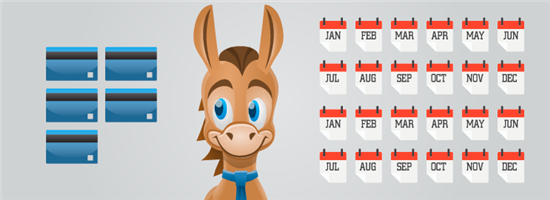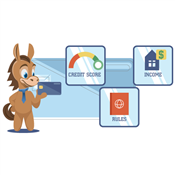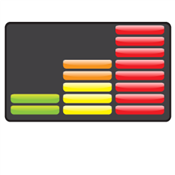Chase 5/24 Rule: What You Need to Know
Ad Disclosure: This article contains references to products from our partners. We receive compensation if you apply or shop through links in our content. You help support CreditDonkey by using our links.
Applying for a new Chase card? Not so fast. The 5/24 rule can make you ineligible. Learn what the Chase 5/24 rule is and which credit cards are impacted.
 |
| © CreditDonkey |
Chase is known for offering jaw-dropping sign-up bonuses and lucrative rewards on their credit cards.
But Chase is one of the more restrictive issuers. The 5/24 policy can disqualify people even with perfect credit scores.
Read on to learn everything you need to know about this rule, including important updates.
- What Is the Chase 5/24 Rule?
- List of Impacted Cards (UPDATED)
- What Cards/Accounts Count Towards 5/24
- How Business Card Accounts Work
- How to Get Around the 5/24 Rule
What Is the Chase 5/24 Policy?
The Chase 5/24 rule says that if you have opened 5 or more credit/charge cards in the past 24 months, you will not be approved for Chase card products. It is an unofficial, but widely accepted, rule.
This goes for new credit card accounts with any bank, not just with Chase. Mostly, this is for new personal card accounts. We'll talk about business accounts more in detail.
See the full list of impacted credit cards below.
Which Chase Credit Cards Are Affected?
Chase does not have official information about this rule. So everything we know is from user reports.
IMPORTANT UPDATE: As of November 13, 2018, all Chase cards are bound by this rule according to crowd-sourced info. There are no longer 5/24 rule exceptions.
Previously, the 5/24 rule only applied to the Ultimate Rewards cards and some of the co-branded cards with airline and hotel partners.
Personal cards:
- Chase Freedom Unlimited®
- Chase Sapphire Preferred®
- Chase Sapphire Reserve®
- Chase Marriott Bonvoy Boundless
- Chase Southwest Rapid Rewards Plus
- Chase Southwest Rapid Rewards Premier
- Chase United MileagePlus Club Card
- Chase United MileagePlus Explorer
Business cards:
- Chase Ink Business Cash®
- Chase Ink Business Preferred®
- Chase Ink Business Unlimited®
- Chase Southwest Rapid Rewards Premier Business
- Chase United MileagePlus Explorer Business
Update: The following list of cards used to be not subjected to the rule. But as of November 2018, these cards are now also affected:
- Chase Disney Visa Card
- Chase Disney Premier Visa
- Chase Starbucks Rewards Visa
- Chase Amazon Rewards Visa
- Chase IHG Rewards Club Premier
- Chase World of Hyatt
- Chase British Airways Visa
- Chase Aer Lingus Visa Signature
- Chase Iberia Visa Signature
- Chase AARP
What Kind of Cards and Accounts Count Towards 5/24?
Chase counts new accounts on your personal credit report in the past 24 months.
As long as you opened the account in the past 2 years, it will count. Even if you have closed an account, it still counts as part of the 5/24.
These type of accounts may count towards your 5/24 limit:
- New credit or charge card accounts
- Store credit card accounts
- Authorized user accounts on someone else's personal credit or charge card
- Business credit cards from Capital One, Discover, and TD Bank
And these type of accounts do NOT count towards 5/24:
- Bank debit card accounts
- Business credit cards from most issuers (except for those listed above)
- Loans, such as student loans, mortgages, car loans, and personal loans
- Denied credit card application requests
Let's explain some of these in detail below.
There no place where you can check your status with Chase. You need to get your credit report and count the number of new open card accounts in the past 24 months. You can order one free credit report from each of the 3 credit bureaus every year at annualcreditreport.com.
How Business Card Accounts Work
The 5/24 rule is only for card accounts on your personal credit report. So this depends on if the card issuer reports their business credit cards to personal credit bureaus. Some do not, so their business cards won't count toward your 5/24 limit.
Issuers that DON'T report business cards to personal credit bureaus are:
- American Express
- Bank of America
- Barclay's
- Chase
- Citi
- U.S. Bank
- Wells Fargo
So you can apply for business cards from those banks and they will not count towards 5/24.
Banks that DO report are:
- Capital One
- Discover
- TD Bank
Business cards from these banks will count as part of your 5/24. So hold off on these until after your Chase applications.
What About Chase Business Cards?
Chase business cards are impacted by the 5/24 rule. This means you will not be approved if you are over the limit.
However, once you have gotten approved, the Chase business card will not add to the 5-card limit, since Chase business cards don't report to personal credit bureaus.
So if you have both Chase personal and business cards you want to apply to, it's important to strategize the order of your applications.
Do Authorized User Accounts Count?
If you are an authorized user on someone else's personal card, it will show up on your personal report too. And yes, this counts towards 5/24.
You may be able to call Chase's reconsideration line and ask them not to count the authorized user accounts. Your success will depend on how receptive the rep is.
Or you can just completely remove the authorized user account from your credit report. The primary user will have to remove you as their authorized user. Then you can call the 3 credit bureaus (Equifax, Experian, TransUnion) and ask them to remove the account.
How to Get Around the 5/24 Rule
If you're already at or over 5/24, but really want one of the cards, there are a couple of ways you may still be able to get your hands on one.
- Request a product change. You can only request a product change within the same family of cards. For example, you can't go from a personal card to business card. Or from a Freedom Unlimited card to a Southwest card. You can, however, change between Ultimate Rewards cards, or between Southwest cards, etc.
Some cards require that your account be at least 1 year old before a product change. And note that you will not receive the sign-up bonus.
- In-branch pre-approvals. This has been reported to bypass the 5/24 rule only if you get the pre-approval at a branch. Online pre-approvals do not work.
Sometimes, the banker will just tell you if you have pre-approved offers. Or you can also ask yourself. Usually, people report being more successful when it came from the banker first. They were able to get one of the 5/24 rule-bound cards even though they were over the limit.
Bottom Line
Chase's 5/24 rule is important to know. It can affect your approval even if you have an excellent credit score. It also means you need to be smart with which cards you want to apply for and in what order. If you want any of the Chase cards affected by the rule, make sure you prioritize those applications first. Strategize your applications so you can make the best of this policy.
Write to Anna G at feedback@creditdonkey.com. Follow us on Twitter and Facebook for our latest posts.
Note: This website is made possible through financial relationships with some of the products and services mentioned on this site. We may receive compensation if you shop through links in our content. You do not have to use our links, but you help support CreditDonkey if you do.
Editorial Note: Any opinions, analyses, reviews or recommendations expressed in this article are those of the author's alone, and have not been reviewed, approved or otherwise endorsed by any card issuer. This site may be compensated through the Advertiser's affiliate programs.
Editorial Note: This content is not provided by Chase. Any opinions, analyses, reviews or recommendations expressed in this article are those of the author's alone, and have not been reviewed, approved or otherwise endorsed by Chase. This site may be compensated through the Advertiser's affiliate programs.
Disclaimer: The information for the Southwest Rapid Rewards Premier Business Credit Card has been collected independently by CreditDonkey. The card details on this page have not been reviewed or provided by the card issuer.
Read Next:






